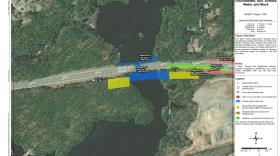A pair of new laws in New Hampshire aims to provide firefighters with more protection against cancers caused by their profession. Cancer is a leading cause of death among firefighters nationwide, according to the CDC.
One law establishes a two-year cancer screening pilot program for active and retired firefighters. The other increases protections for firefighters from PFAS chemicals in their uniforms and firefighting gear, and aims to streamline the process of switching to PFAS-free apparel. Exposure to PFAS chemicals have been linked to certain types of cancers and other health issues.
Brain Ryll is a Portsmouth firefighter and the president of Professional Fire Fighters of New Hampshire. He’s been advocating for these laws, and he spoke with NHPR’s All Things Considered host Julia Furukawa about what their passage would mean for firefighters across the state.
Transcript
PFAS chemicals are in firefighting uniforms and in protective equipment. And up until 2019, it was legal here in New Hampshire to use firefighting foam that contained these forever chemicals. There's more awareness now about this, but for you, what was the tipping point when folks really decided to take action on this?
When I began in the fire service about 18 years ago, this was never really a hot button issue. And then we started having firefighters that we worked with day in and day out develop cancer. So we started wondering why this was happening so frequently [as] it was becoming more and more prevalent throughout the state.
The International Association of Firefighters later drew much more attention to it. They were working to try and eliminate these PFAS chemicals, not only in foams but in firefighter turnout gear. It's the gear that we put on day in and day out to keep our members safe. But the chemicals that [manufacturers] are using are actually giving us cancer. And so once we found out that this was a problem, we started to kind of shed more light on the issue here in the state.
What will these bills mean for firefighters across the state? What's it going to look like in practice?
So ultimately there's a lot still to be done. The day-to-day practice for our members remains unchanged at the moment. We are still utilizing best practices as far as trying to eliminate as many of these toxins as possible. Some of the stuff that [we do], we can shower immediately after a fire, or we can clean our turnout gear immediately after a fire. Things that we can manage, we will manage. But the problem is right now, we're provided with turnout gear that we can't do anything about, so we have to wear it. And that's the primary goal here, to try and eliminate these carcinogens in the protective gear that we wear.
There is already a pilot program for cancer screening here. What do you hope will come out of that and how many people could that reach?
So we started, last year, developing a pilot program just prior to this legislation. We were able to screen just over 100 firefighters for cancer at our state convention. And in that screening process, the results have been somewhat jaw dropping. So far, we've had one confirmed case of cancer, as well as 180 additional actionable findings—which means those members will have to get out, go for a follow up with their primary care physician, and really determine what those issues were. And of those, there were 50 plus high risk findings. So it's extremely concerning what we found in just such a small program.
Now we're going to extrapolate that out and potentially screen up to about 4,000 firefighters in the state of New Hampshire. The statistics show[ed] us that we’re going to find more and more firefighters with cancer throughout this program. Ultimately we'd love to come back and say that the results yielded zero findings for cancer. But we know that's not going to be the case. So hopefully we can save some lives. And we all already know, too, that early detection also saves money on health care costs.









